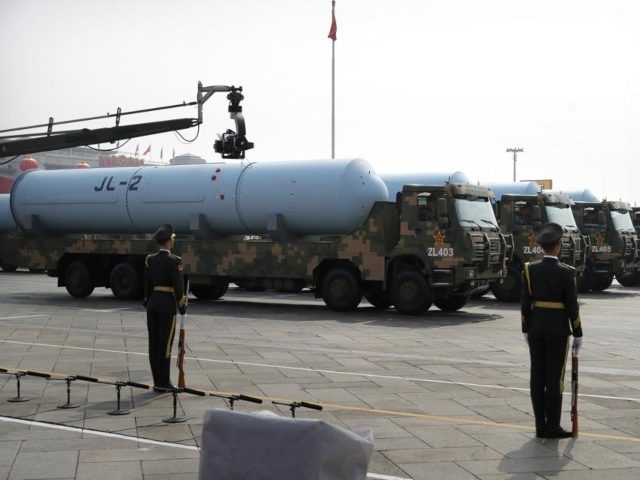China’s nuclear arsenal increased from 320 weapons in 2020 to 350 in 2021, according to a report published by the Stockholm International Peace Research Institute (SIPRI) on Monday.
“China is in the middle of a significant modernization and expansion of its nuclear weapon inventory,” according to the authors of the SIPRC study. The time period studied by the new paper includes the entirety of the Chinese coronavirus pandemic, a global crisis that significantly damaged most world economies but has resulted in an economic boom for the Chinese Communist Party (CCP).
“China now publicly displays its nuclear forces more frequently than in the past but releases little information about force numbers or future development plans,” the authors noted.
“Overall, inventories of nuclear warheads continue to decline,” the SIPRI report concluded. “This is primarily due to the USA and Russia dismantling retired warheads.”
“Global reductions of operational warheads appear to have stalled, and their numbers may be rising again. At the same time, both the USA and Russia have extensive and expensive programmes under way to replace and modernize their nuclear warheads, missile and aircraft delivery systems, and nuclear weapon production facilities,” according to the report.
“[B]y the end of 2020 Russia and the USA had still not agreed to extend their last-remaining bilateral nuclear arms control treaty, the 2010 Treaty on Measures for the Further Reduction and Limitation of Strategic Offensive Arms (New START), which was due to expire on 5 February 2021,” the SIPRI recalled.
“The fate of New START remained in the balance due to the different approaches and goals of the two sides: Russia focused on preserving the treaty, while the USA sought to convince China — with no success — to join the agreement and to make it more comprehensive in terms of the weapons covered and the verification measures imposed,” the institute noted.
Under the administration of U.S. President Joe Biden, Washington and Moscow extended New START on February 3, just two days before the deal was set to expire. As the SIPRI noted on Monday, the administration of former U.S. President Donald Trump sought to bring Beijing onboard New START but was met with a stiff rebuff from China’s ruling Communist Party. Biden chose not to continue the campaign.
In response to the U.S.’s invitation to join a potential successor to the New START deal, Beijing in July 2020 claimed that it would “only join the talks if the US reduced its arsenal to match China’s much smaller nuclear deterrent,” Agence France-Presse reported at the time.
“China’s opposition of the so-called trilateral arms control negotiations is very clear,” Chinese foreign ministry spokesman Zhao Lijian said of the failed treaty.
“However, the US continues to pester China, even distorting China’s position,” Zhao claimed.

COMMENTS
Please let us know if you're having issues with commenting.